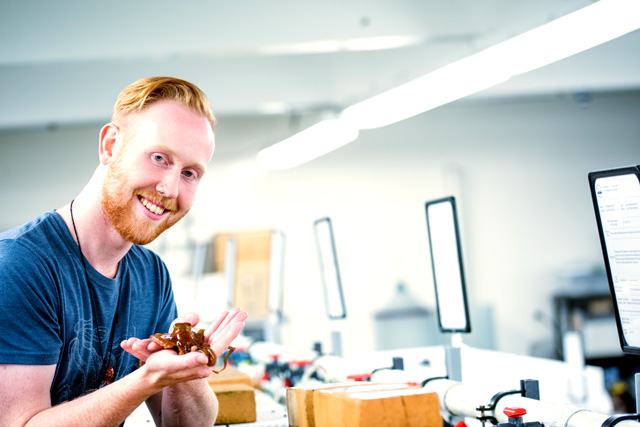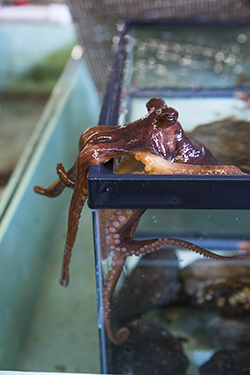
Rule number one with octopuses: Don’t turn your back on them.
“They’re highly intelligent and curious. When you walk away, they will try to slip out of the tank,” says Declan Cowan.
It’s something Cowan keeps in mind while working with 14 Octopus rubescens (commonly known as the red octopus) at HSU’s Telonicher Marine Lab in Trinidad. Since 2015, the HSU Zoology and Biology major has had a unique opportunity to study and interact with one of the world’s smartest invertebrates.
“HSU and the lab are so supportive of hands-on undergrad research and all the things I’ve taken on,” he says.
The focus of his study, which mirrors research by Walla Walla University Professor Kirt Onthank, is whether red octopuses prefer to eat crabs with higher levels of lipids. Found in the digestive glands of octopuses, lipids play an important role in their growth and development.
Cowan says the research, part of his senior thesis project, can help shed light on intertidal ecosystems and how they’re changing.

“It’s interesting to understand these shifts by observing the role of a successful predator like the octopus,” he says.
Studying octopuses is one thing. Making sure they thrive is another.
The red octopus is common in this part of the world and is known for being brainy. One at the Monterey Bay Aquarium, for instance, latched onto a sponge and then made a dash for it, hiding for a year before it was found.
Considering their smarts, Cowan makes sure to interact with them regularly and keep them stimulated.
“We sometimes put a crab in a dog toy. They have to figure out how to get it out,” he says.
They’re cannibalistic by nature, so they need space. That means 14 separate tanks. They’re also voracious eaters — Cowan feeds them four times each week.
HSU students have studied the red octopus in the past, though not so many at one time. “It’s an impressive sample size and a rarity,” says marine lab technician Grant Eberle. He and technician Dave Hoskins helped Cowan and former lab partner, Ashley Abitz, get the project up and running.
Caring for and studying these animals is a labor of love—one that started at the marine lab, which he visited frequently as a kid growing up in Arcata. “I feel like I’ve come full circle. I’m now at the marine lab where it all started.”
Cowan became obsessed with the red octopus last summer as an intern at the Monterey Bay Aquarium where he studied cephalopod husbandry.
It was then he realized the importance of studying octopuses in a sustainable way.
“I want to find ways to improve husbandry for these animals in order to raise them in captivity so we don’t have to take from the wild,” he says.